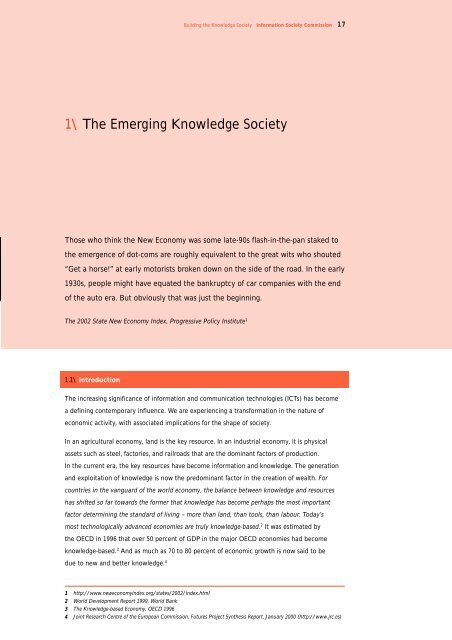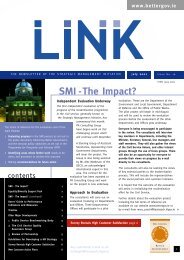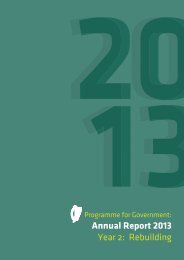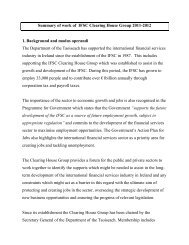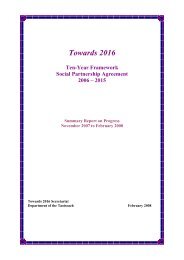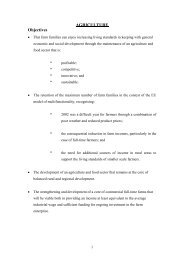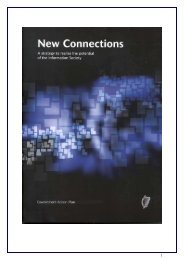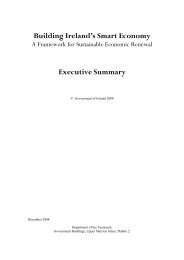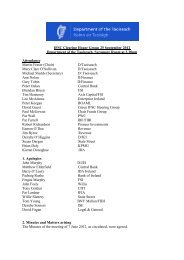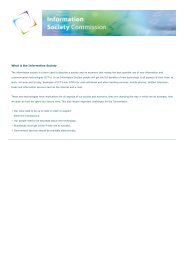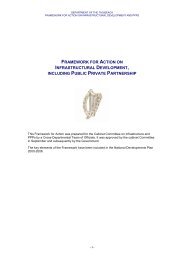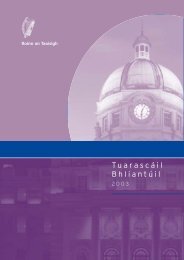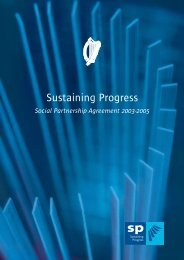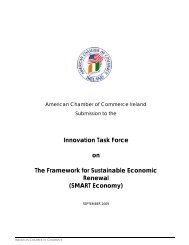<strong>Building</strong> <strong>the</strong> <strong>Knowledge</strong> <strong>Society</strong> Information <strong>Society</strong> Commission 171\ The Emerging <strong>Knowledge</strong> <strong>Society</strong>Those who think <strong>the</strong> New Economy was some late-90s flash-in-<strong>the</strong>-pan staked to<strong>the</strong> emergence <strong>of</strong> dot-coms are roughly equivalent to <strong>the</strong> great wits who shouted“Get a horse!” at early motorists broken down on <strong>the</strong> side <strong>of</strong> <strong>the</strong> road. In <strong>the</strong> early1930s, people might have equated <strong>the</strong> bankruptcy <strong>of</strong> car companies with <strong>the</strong> end<strong>of</strong> <strong>the</strong> auto era. But obviously that was just <strong>the</strong> beginning.The 2002 State New Economy Index, Progressive Policy Institute 11.1\ IntroductionThe increasing significance <strong>of</strong> information and communication technologies (ICTs) has becomea defining contemporary influence. We are experiencing a transformation in <strong>the</strong> nature <strong>of</strong>economic activity, with associated implications for <strong>the</strong> shape <strong>of</strong> society.In an agricultural economy, land is <strong>the</strong> key resource. In an industrial economy, it is physicalassets such as steel, factories, and railroads that are <strong>the</strong> dominant factors <strong>of</strong> production.In <strong>the</strong> current era, <strong>the</strong> key resources have become information and knowledge. The generationand exploitation <strong>of</strong> knowledge is now <strong>the</strong> predominant factor in <strong>the</strong> creation <strong>of</strong> wealth. Forcountries in <strong>the</strong> vanguard <strong>of</strong> <strong>the</strong> world economy, <strong>the</strong> balance between knowledge and resourceshas shifted so far towards <strong>the</strong> former that knowledge has become perhaps <strong>the</strong> most importantfactor determining <strong>the</strong> standard <strong>of</strong> living – more than land, than tools, than labour. Today’smost technologically advanced economies are truly knowledge-based. 2 It was estimated by<strong>the</strong> OECD in 1996 that over 50 percent <strong>of</strong> GDP in <strong>the</strong> major OECD economies had becomeknowledge-based. 3 And as much as 70 to 80 percent <strong>of</strong> economic growth is now said to bedue to new and better knowledge. 41 http://www.neweconomyindex.org/states/2002/index.html2 World Development Report 1999, World Bank3 The <strong>Knowledge</strong>-based Economy, OECD 19964 Joint Research Centre <strong>of</strong> <strong>the</strong> European Commission, Futures Project Syn<strong>the</strong>sis Report, January 2000 (http://www.jrc.es)
18 <strong>Building</strong> <strong>the</strong> <strong>Knowledge</strong> <strong>Society</strong> Information <strong>Society</strong> CommissionThe industrial revolution laid <strong>the</strong> foundation for <strong>the</strong> transformation from agriculture to industrybasedeconomic production. Living standards were raised, and patterns <strong>of</strong> living changed too.The significance <strong>of</strong> <strong>the</strong> current revolution around <strong>the</strong> importance <strong>of</strong> information and knowledgeis no less pr<strong>of</strong>ound. In addition, <strong>the</strong> pace <strong>of</strong> change currently being experienced – drivenby <strong>the</strong> technology advances <strong>of</strong> <strong>the</strong> late 20th and early 21st centuries – is without precedent,and presents new sets <strong>of</strong> challenges for government and <strong>the</strong> management <strong>of</strong> public policydevelopment.1.2\ The <strong>Knowledge</strong>-Based Economy<strong>Knowledge</strong> has always been a factor <strong>of</strong> production, and a driver <strong>of</strong> economic and socialdevelopment. Earlier economies depended, for example, on knowledge about how to farm,how to build and how to manufacture. However, technology-related developments havefundamentally transformed <strong>the</strong> degree to which knowledge is being integrated into economicactivity, to <strong>the</strong> extent that we are witnessing a shift in <strong>the</strong> very basis <strong>of</strong> competitive advantage.Unlike capital and labour, information and knowledge have many <strong>of</strong> <strong>the</strong> characteristics <strong>of</strong> whateconomists call public goods. Once discovered and made public, knowledge can be shared atzero marginal cost and its value is not depleted in consumption – it is non-rival. Indeed, <strong>the</strong>economic and social value <strong>of</strong> information and knowledge actually increases as it is shared withand used by o<strong>the</strong>rs. Just as <strong>the</strong> importance <strong>of</strong> land in production changed dramatically as <strong>the</strong>economy moved from agriculture to industry, so too does <strong>the</strong> movement to a knowledge economynecessitate a rethinking <strong>of</strong> economic fundamentals. 5There is a real danger that this underlying significance has been clouded by developments <strong>of</strong><strong>the</strong> past couple <strong>of</strong> years. It is clear that <strong>the</strong> emergence <strong>of</strong> <strong>the</strong> Internet and related technologiesduring <strong>the</strong> 1990s generated an over-hyping <strong>of</strong> expectations. The major stock market correction<strong>of</strong> April 2000, and its subsequent impact on <strong>the</strong> technology sector worldwide, was perhapsan inevitable consequence. As with most major technological advances, progress is occurringnei<strong>the</strong>r smoothly, nor as originally envisaged. If we consider <strong>the</strong> history <strong>of</strong> o<strong>the</strong>r technologicalrevolutions, none <strong>of</strong> this should be a surprise. Of nearly 1,000 US companies that tried tobuild and sell gas-powered automobiles before 1927, only 200 survived long enough to bringa commercially suitable vehicle to <strong>the</strong> market. Of <strong>the</strong>se fewer than a handful operate today,but <strong>the</strong>y account for a substantial share <strong>of</strong> a much larger economy. The lesson is thattechnological revolutions take time, and <strong>the</strong> digital technology revolution has just begun. 6The capacity to manipulate, store and transmit large quantities <strong>of</strong> information cheaply hasincreased at a staggering rate over recent years. The digitisation <strong>of</strong> information and associatedpervasiveness <strong>of</strong> <strong>the</strong> Internet is facilitating a new application <strong>of</strong> knowledge to economic activity,and thus a new knowledge intensity in <strong>the</strong> economy generally.5 Public Policy for a <strong>Knowledge</strong> Economy, Joseph E. Stiglitz 19996 Digital Economy 2002, US <strong>Department</strong> <strong>of</strong> Commerce 2002


